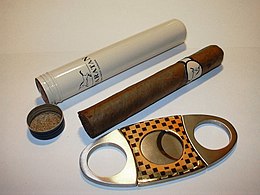Kentucky bill to allow cigar bars passes out of committee, would override local smoking bans

Update, March 2, 2025: House Bill 211 passed 74-19 with a committee substitute and two floor amendments on Feb. 18. It resides in the Senate State and Local Government Committee.
By Melissa Patrick
Kentucky Health News
Despite public health concerns, a House bill to allow indoor smoking in cigar bars has passed out of committee and awaits a vote in the full House.

House Bill 211, sponsored by Rep. Chris Lewis, R-Louisville, passed out of the House Local Government Committee on Tuesday, Feb. 11.
“This bill will not roll back any municipalities’ local smoke-free law,” Lewis said. “That’s not the intention. That is not what it does. This is not about having a cigar in a regular bar or a bowling alley or a restaurant. This will not allow that.”
The bill says cigar bars would be establishments that hold a retail drink license for on-premises consumption of alcoholic beverages; generate at least 15% of their annual income from the on-site sale of cigars, pipe tobacco and related products; do not knowingly sell or permit entrance to persons under 21 years of age; and do not permit the use of electronic cigarettes, vapor products or other tobacco products.
Anthony Piagentini, a Louisville council member who chairs the city’s Republican caucus, said the bill focuses on small businesses and aligns with the lifestyle of horse racing and bourbon industries.
“People are coming for the Derby, people are coming for these large events, and they are quite literally going across the river and doing business in Indiana when they find out that we have no venue whatsoever to enjoy a cigar and a bourbon in a venue like this,” Piagentini said.
The bill would allow cigar bars even in communities with existing smoke-free laws.

Doug Hogan, government relations director for the American Cancer Society’s Cancer Action Network, urged lawmakers to vote against the bill. He said the legislation undermines local smoke-free ordinances and negatively impacts public health.
“The bill will not roll back all elements of the 44 smoke-free ordinances, but it does roll back some of those and provide local government officials with no authority to stop what may be described as a very loosely designed ‘cigar bar,’” Hogan said.
Dr. Michael Gieske, director of the lung cancer screening program at St. Elizabeth Healthcare in Northern Kentucky, talked about the value of prevention when it comes to smoking, noting that secondhand smoke is the third leading cause of lung cancer after cigarette smoking and radon.
“When you have a comprehensive smoke-free policy, that’s where you get the biggest bang for your buck,” Gieske said. “It lowers smoking in youth, it lowers smoking across the board. It lowers lung cancer mortality. If a smoking policy is not comprehensive, you don’t see that same benefit.”
HB 211 provides a nod to public health with rules aimed at protecting businesses that share a wall or a common, enclosed air space from cigar bar smoke. It also calls for a smoke-free space for the delivery of supplies, mail and other items by persons other than employees and patrons. But smoke-free advocates say this is not enough.
Pushback on HB 211
Hogan stressed that the cancer-causing toxic chemicals in secondhand smoke from cigarettes and cigars are the same.
A Kentucky Center for Smoke-free Policy “fact sheet” points to the health benefits that come from having strong, comprehensive smoke-free laws.
“Kentucky communities with strong smoke-free laws are associated with a lower likelihood of hospitalization for COPD, fewer hospitalizations for heart attacks, fewer ER visits for asthma, leading to significant healthcare cost savings,” says the fact sheet. “These communities are also associated with fewer preterm births and fewer youth who start to smoke. Kentucky communities with partial smoke-free laws that exempt certain kinds of businesses like bars do not confer these same benefits.”
KCSP’s fact sheet also voices concern about the exposure of secondhand smoke to employees working in the cigar bars, which it says, “has been proven to cause heart disease, stroke, cancer, and sudden infant death syndrome.”
In addition, it says, “The CDC has made it clear there is no safe level of exposure to secondhand smoke. While ventilation systems can reduce odor, they cannot eliminate the harmful particles and toxins from secondhand smoke. The American Society of Heating, Refrigerating, and Air-Conditioning Engineers states that the only way to eliminate indoor exposure to environmental tobacco smoke is to prohibit all indoor smoking activity.”
Democratic Reps. George Brown of Lexington and Sarah Stalker of Louisville were the only two no votes.
Brown, who was on the Lexington-Fayette Urban County Government Council when Lexington passed its smoke-free ordinance more than 20 years ago, said this bill is not something Fayette County wants to see passed.
“I have not had a lot of comments from people in Fayette County except one, my former colleague on city council. And he said we don’t need it in Fayette County,” he said. “I think that this is overriding local control and local control in Lexington, Fayette County says that we do not want smoking of any kind in Fayette County.”